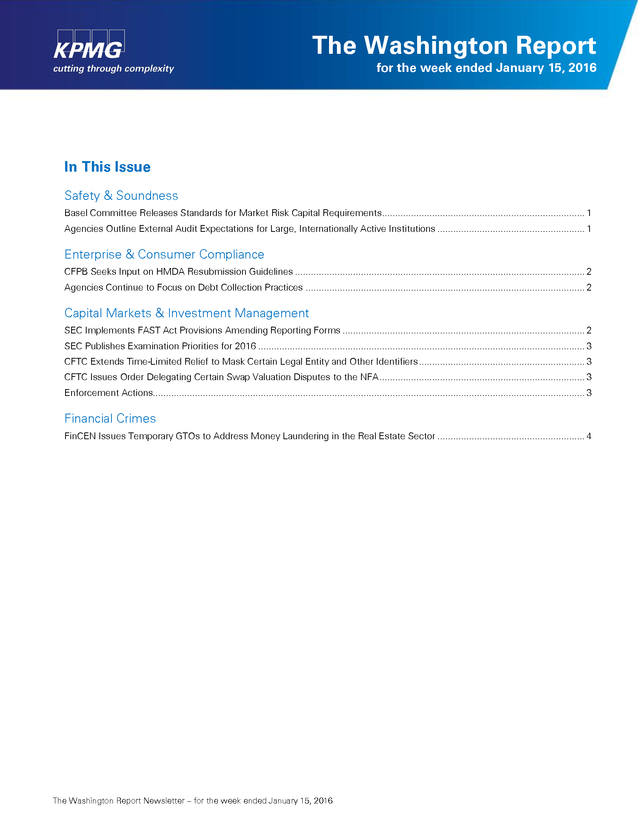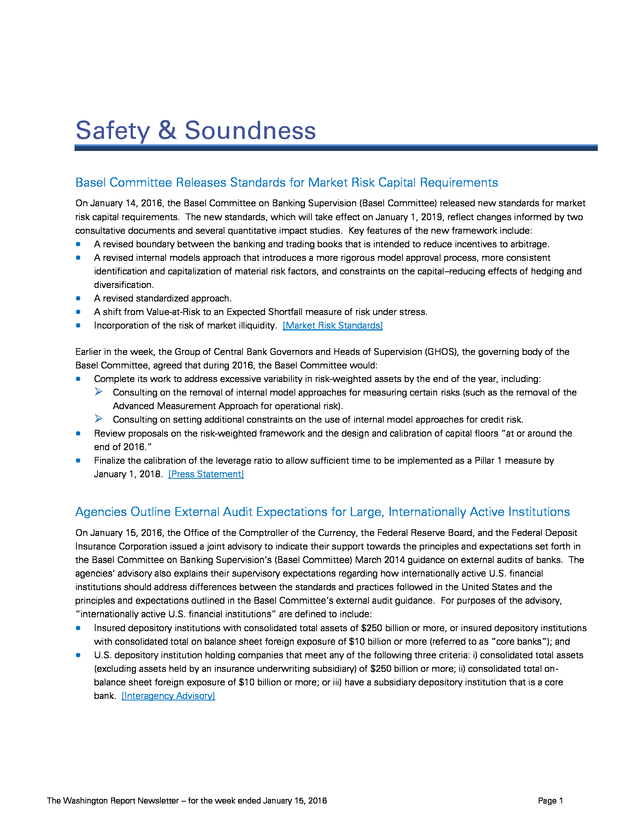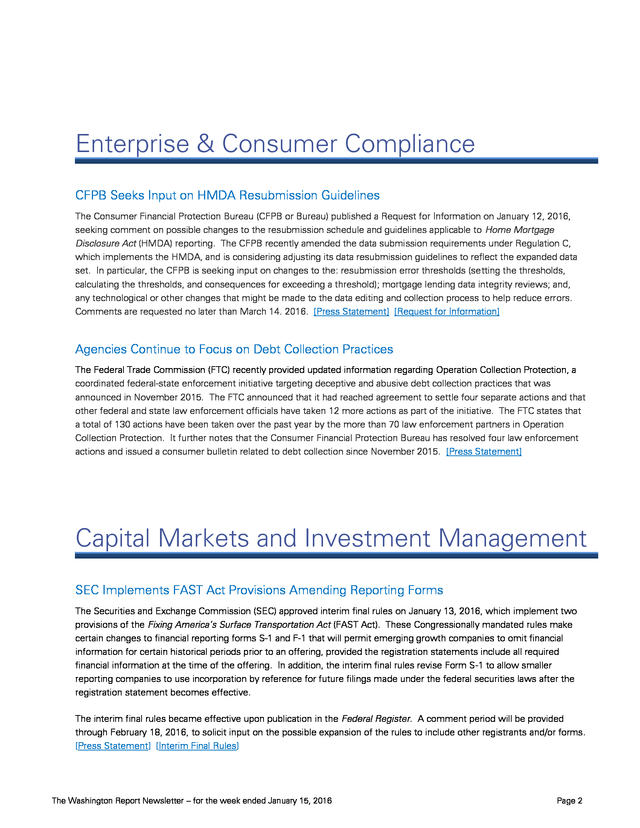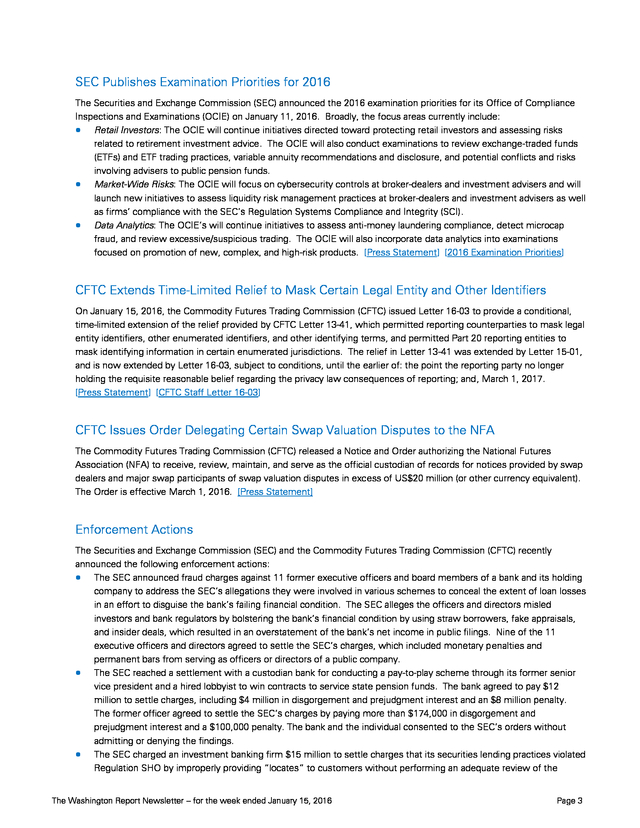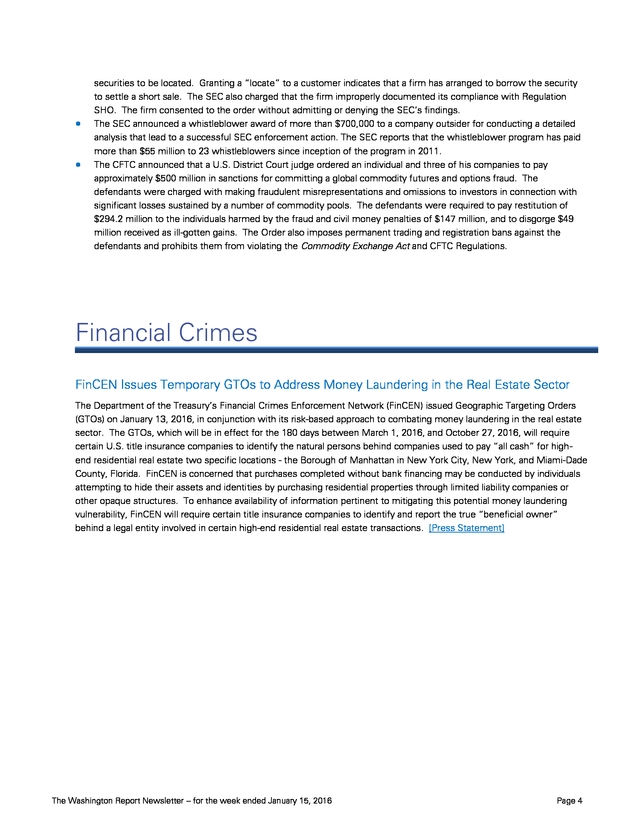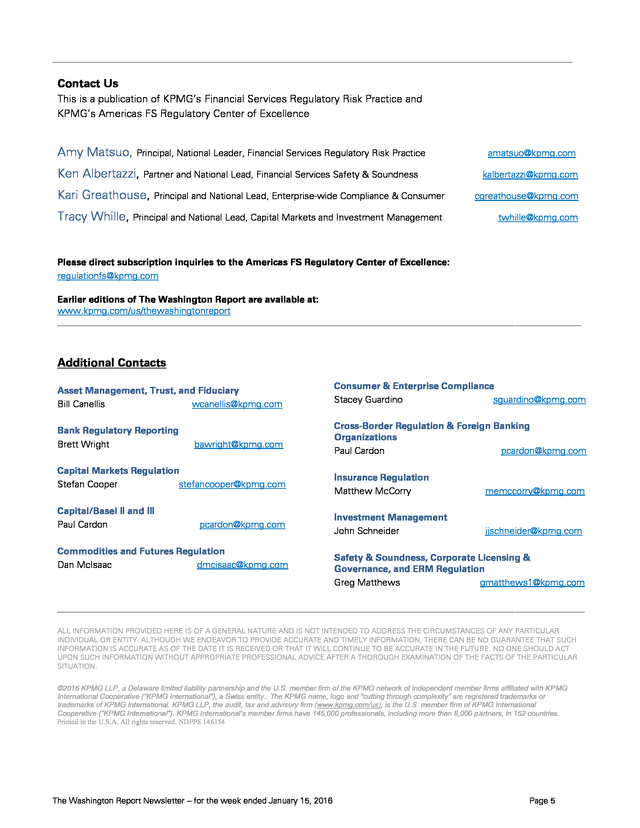Description
The Washington Report
for the week ended January 15, 2016
In This Issue
Safety & Soundness
Basel Committee Releases Standards for Market Risk Capital Requirements ............................................................................. 1
Agencies Outline External Audit Expectations for Large, Internationally Active Institutions ........................................................ 1
Enterprise & Consumer Compliance
CFPB Seeks Input on HMDA Resubmission Guidelines .............................................................................................................. 2
Agencies Continue to Focus on Debt Collection Practices ..........................................................................................................
2 Capital Markets & Investment Management SEC Implements FAST Act Provisions Amending Reporting Forms ............................................................................................ 2 SEC Publishes Examination Priorities for 2016 ............................................................................................................................ 3 CFTC Extends Time-Limited Relief to Mask Certain Legal Entity and Other Identifiers ...............................................................
3 CFTC Issues Order Delegating Certain Swap Valuation Disputes to the NFA .............................................................................. 3 Enforcement Actions.................................................................................................................................................................... 3 Financial Crimes FinCEN Issues Temporary GTOs to Address Money Laundering in the Real Estate Sector ........................................................
4 The Washington Report Newsletter – for the week ended January 15, 2016 . The Washington Report Safety & Soundness Basel Committee Releases Standards for Market Risk Capital Requirements On January 14, 2016, the Basel Committee on Banking Supervision (Basel Committee) released new standards for market risk capital requirements. The new standards, which will take effect on January 1, 2019, reflect changes informed by two consultative documents and several quantitative impact studies. Key features of the new framework include: ï‚· A revised boundary between the banking and trading books that is intended to reduce incentives to arbitrage. ï‚· A revised internal models approach that introduces a more rigorous model approval process, more consistent identification and capitalization of material risk factors, and constraints on the capital–reducing effects of hedging and diversification. ï‚· A revised standardized approach. ï‚· A shift from Value-at-Risk to an Expected Shortfall measure of risk under stress. ï‚· Incorporation of the risk of market illiquidity. [Market Risk Standards] Earlier in the week, the Group of Central Bank Governors and Heads of Supervision (GHOS), the governing body of the Basel Committee, agreed that during 2016, the Basel Committee would: ï‚· Complete its work to address excessive variability in risk-weighted assets by the end of the year, including:  Consulting on the removal of internal model approaches for measuring certain risks (such as the removal of the Advanced Measurement Approach for operational risk).  Consulting on setting additional constraints on the use of internal model approaches for credit risk. ï‚· Review proposals on the risk-weighted framework and the design and calibration of capital floors “at or around the end of 2016.” ï‚· Finalize the calibration of the leverage ratio to allow sufficient time to be implemented as a Pillar 1 measure by January 1, 2018.
[Press Statement] Agencies Outline External Audit Expectations for Large, Internationally Active Institutions On January 15, 2016, the Office of the Comptroller of the Currency, the Federal Reserve Board, and the Federal Deposit Insurance Corporation issued a joint advisory to indicate their support towards the principles and expectations set forth in the Basel Committee on Banking Supervision’s (Basel Committee) March 2014 guidance on external audits of banks. The agencies’ advisory also explains their supervisory expectations regarding how internationally active U.S. financial institutions should address differences between the standards and practices followed in the United States and the principles and expectations outlined in the Basel Committee’s external audit guidance.
For purposes of the advisory, “internationally active U.S. financial institutions” are defined to include: ï‚· Insured depository institutions with consolidated total assets of $250 billion or more, or insured depository institutions with consolidated total on balance sheet foreign exposure of $10 billion or more (referred to as “core banks”); and ï‚· U.S. depository institution holding companies that meet any of the following three criteria: i) consolidated total assets (excluding assets held by an insurance underwriting subsidiary) of $250 billion or more; ii) consolidated total onbalance sheet foreign exposure of $10 billion or more; or iii) have a subsidiary depository institution that is a core bank.
[Interagency Advisory] The Washington Report Newsletter – for the week ended January 15, 2016 Page 1 . Enterprise & Consumer Compliance CFPB Seeks Input on HMDA Resubmission Guidelines The Consumer Financial Protection Bureau (CFPB or Bureau) published a Request for Information on January 12, 2016, seeking comment on possible changes to the resubmission schedule and guidelines applicable to Home Mortgage Disclosure Act (HMDA) reporting. The CFPB recently amended the data submission requirements under Regulation C, which implements the HMDA, and is considering adjusting its data resubmission guidelines to reflect the expanded data set. In particular, the CFPB is seeking input on changes to the: resubmission error thresholds (setting the thresholds, calculating the thresholds, and consequences for exceeding a threshold); mortgage lending data integrity reviews; and, any technological or other changes that might be made to the data editing and collection process to help reduce errors. Comments are requested no later than March 14. 2016.
[Press Statement] [Request for Information] Agencies Continue to Focus on Debt Collection Practices The Federal Trade Commission (FTC) recently provided updated information regarding Operation Collection Protection, a coordinated federal-state enforcement initiative targeting deceptive and abusive debt collection practices that was announced in November 2015. The FTC announced that it had reached agreement to settle four separate actions and that other federal and state law enforcement officials have taken 12 more actions as part of the initiative. The FTC states that a total of 130 actions have been taken over the past year by the more than 70 law enforcement partners in Operation Collection Protection.
It further notes that the Consumer Financial Protection Bureau has resolved four law enforcement actions and issued a consumer bulletin related to debt collection since November 2015. [Press Statement] Capital Markets and Investment Management SEC Implements FAST Act Provisions Amending Reporting Forms The Securities and Exchange Commission (SEC) approved interim final rules on January 13, 2016, which implement two provisions of the Fixing America’s Surface Transportation Act (FAST Act). These Congressionally mandated rules make certain changes to financial reporting forms S-1 and F-1 that will permit emerging growth companies to omit financial information for certain historical periods prior to an offering, provided the registration statements include all required financial information at the time of the offering.
In addition, the interim final rules revise Form S-1 to allow smaller reporting companies to use incorporation by reference for future filings made under the federal securities laws after the registration statement becomes effective. The interim final rules became effective upon publication in the Federal Register. A comment period will be provided through February 18, 2016, to solicit input on the possible expansion of the rules to include other registrants and/or forms. [Press Statement] [Interim Final Rules] The Washington Report Newsletter – for the week ended January 15, 2016 Page 2 . SEC Publishes Examination Priorities for 2016 The Securities and Exchange Commission (SEC) announced the 2016 examination priorities for its Office of Compliance Inspections and Examinations (OCIE) on January 11, 2016. Broadly, the focus areas currently include: ï‚· Retail Investors: The OCIE will continue initiatives directed toward protecting retail investors and assessing risks related to retirement investment advice. The OCIE will also conduct examinations to review exchange-traded funds (ETFs) and ETF trading practices, variable annuity recommendations and disclosure, and potential conflicts and risks involving advisers to public pension funds. ï‚· Market-Wide Risks: The OCIE will focus on cybersecurity controls at broker-dealers and investment advisers and will launch new initiatives to assess liquidity risk management practices at broker-dealers and investment advisers as well as firms’ compliance with the SEC’s Regulation Systems Compliance and Integrity (SCI). ï‚· Data Analytics: The OCIE’s will continue initiatives to assess anti-money laundering compliance, detect microcap fraud, and review excessive/suspicious trading. The OCIE will also incorporate data analytics into examinations focused on promotion of new, complex, and high-risk products.
[Press Statement] [2016 Examination Priorities] CFTC Extends Time-Limited Relief to Mask Certain Legal Entity and Other Identifiers On January 15, 2016, the Commodity Futures Trading Commission (CFTC) issued Letter 16-03 to provide a conditional, time-limited extension of the relief provided by CFTC Letter 13-41, which permitted reporting counterparties to mask legal entity identifiers, other enumerated identifiers, and other identifying terms, and permitted Part 20 reporting entities to mask identifying information in certain enumerated jurisdictions. The relief in Letter 13-41 was extended by Letter 15-01, and is now extended by Letter 16-03, subject to conditions, until the earlier of: the point the reporting party no longer holding the requisite reasonable belief regarding the privacy law consequences of reporting; and, March 1, 2017. [Press Statement] [CFTC Staff Letter 16-03] CFTC Issues Order Delegating Certain Swap Valuation Disputes to the NFA The Commodity Futures Trading Commission (CFTC) released a Notice and Order authorizing the National Futures Association (NFA) to receive, review, maintain, and serve as the official custodian of records for notices provided by swap dealers and major swap participants of swap valuation disputes in excess of US$20 million (or other currency equivalent). The Order is effective March 1, 2016. [Press Statement] Enforcement Actions The Securities and Exchange Commission (SEC) and the Commodity Futures Trading Commission (CFTC) recently announced the following enforcement actions: ï‚· The SEC announced fraud charges against 11 former executive officers and board members of a bank and its holding company to address the SEC’s allegations they were involved in various schemes to conceal the extent of loan losses in an effort to disguise the bank’s failing financial condition.
The SEC alleges the officers and directors misled investors and bank regulators by bolstering the bank’s financial condition by using straw borrowers, fake appraisals, and insider deals, which resulted in an overstatement of the bank’s net income in public filings. Nine of the 11 executive officers and directors agreed to settle the SEC’s charges, which included monetary penalties and permanent bars from serving as officers or directors of a public company. ï‚· The SEC reached a settlement with a custodian bank for conducting a pay-to-play scheme through its former senior vice president and a hired lobbyist to win contracts to service state pension funds. The bank agreed to pay $12 million to settle charges, including $4 million in disgorgement and prejudgment interest and an $8 million penalty. The former officer agreed to settle the SEC’s charges by paying more than $174,000 in disgorgement and prejudgment interest and a $100,000 penalty.
The bank and the individual consented to the SEC’s orders without admitting or denying the findings. ï‚· The SEC charged an investment banking firm $15 million to settle charges that its securities lending practices violated Regulation SHO by improperly providing “locates” to customers without performing an adequate review of the The Washington Report Newsletter – for the week ended January 15, 2016 Page 3 . ï‚· ï‚· securities to be located. Granting a “locate” to a customer indicates that a firm has arranged to borrow the security to settle a short sale. The SEC also charged that the firm improperly documented its compliance with Regulation SHO. The firm consented to the order without admitting or denying the SEC’s findings. The SEC announced a whistleblower award of more than $700,000 to a company outsider for conducting a detailed analysis that lead to a successful SEC enforcement action.
The SEC reports that the whistleblower program has paid more than $55 million to 23 whistleblowers since inception of the program in 2011. The CFTC announced that a U.S. District Court judge ordered an individual and three of his companies to pay approximately $500 million in sanctions for committing a global commodity futures and options fraud. The defendants were charged with making fraudulent misrepresentations and omissions to investors in connection with significant losses sustained by a number of commodity pools.
The defendants were required to pay restitution of $294.2 million to the individuals harmed by the fraud and civil money penalties of $147 million, and to disgorge $49 million received as ill-gotten gains. The Order also imposes permanent trading and registration bans against the defendants and prohibits them from violating the Commodity Exchange Act and CFTC Regulations. Financial Crimes FinCEN Issues Temporary GTOs to Address Money Laundering in the Real Estate Sector The Department of the Treasury’s Financial Crimes Enforcement Network (FinCEN) issued Geographic Targeting Orders (GTOs) on January 13, 2016, in conjunction with its risk-based approach to combating money laundering in the real estate sector. The GTOs, which will be in effect for the 180 days between March 1, 2016, and October 27, 2016, will require certain U.S.
title insurance companies to identify the natural persons behind companies used to pay “all cash” for highend residential real estate two specific locations - the Borough of Manhattan in New York City, New York, and Miami-Dade County, Florida. FinCEN is concerned that purchases completed without bank financing may be conducted by individuals attempting to hide their assets and identities by purchasing residential properties through limited liability companies or other opaque structures. To enhance availability of information pertinent to mitigating this potential money laundering vulnerability, FinCEN will require certain title insurance companies to identify and report the true “beneficial owner” behind a legal entity involved in certain high-end residential real estate transactions.
[Press Statement] The Washington Report Newsletter – for the week ended January 15, 2016 Page 4 . ______________________________________________________________________________________________________________________________________________ Contact Us This is a publication of KPMG’s Financial Services Regulatory Risk Practice and KPMG’s Americas FS Regulatory Center of Excellence Amy Matsuo, Principal, National Leader, Financial Services Regulatory Risk Practice Ken Albertazzi, Partner and National Lead, Financial Services Safety & Soundness amatsuo@kpmg.com kalbertazzi@kpmg.com Kari Greathouse, Principal and National Lead, Enterprise-wide Compliance & Consumer cgreathouse@kpmg.com Tracy Whille, Principal and National Lead, Capital Markets and Investment Management twhille@kpmg.com Please direct subscription inquiries to the Americas FS Regulatory Center of Excellence: regulationfs@kpmg.com Earlier editions of The Washington Report are available at: www.kpmg.com/us/thewashingtonreport _______________________________________________________________________________________________________________________________________________ Additional Contacts Asset Management, Trust, and Fiduciary Bill Canellis wcanellis@kpmg.com Consumer & Enterprise Compliance Stacey Guardino sguardino@kpmg.com Bank Regulatory Reporting Brett Wright Cross-Border Regulation & Foreign Banking Organizations Paul Cardon pcardon@kpmg.com bawright@kpmg.com Capital Markets Regulation Stefan Cooper stefancooper@kpmg.com Capital/Basel II and III Paul Cardon pcardon@kpmg.com Commodities and Futures Regulation Dan McIsaac dmcisaac@kpmg.com Insurance Regulation Matthew McCorry memccorry@kpmg.com Investment Management John Schneider jjschneider@kpmg.com Safety & Soundness, Corporate Licensing & Governance, and ERM Regulation Greg Matthews gmatthews1@kpmg.com ________________________________________________________________________________________________________________________________________________ ALL INFORMATION PROVIDED HERE IS OF A GENERAL NATURE AND IS NOT INTENDED TO ADDRESS THE CIRCUMSTANCES OF ANY PARTICULAR INDIVIDUAL OR ENTITY. ALTHOUGH WE ENDEAVOR TO PROVIDE ACCURATE AND TIMELY INFORMATION, THERE CAN BE NO GUARANTEE THAT SUCH INFORMATION IS ACCURATE AS OF THE DATE IT IS RECEIVED OR THAT IT WILL CONTINUE TO BE ACCURATE IN THE FUTURE. NO ONE SHOULD ACT UPON SUCH INFORMATION WITHOUT APPROPRIATE PROFESSIONAL ADVICE AFTER A THOROUGH EXAMINATION OF THE FACTS OF THE PARTICULAR SITUATION. ©2016 KPMG LLP, a Delaware limited liability partnership and the U.S. member firm of the KPMG network of independent member firms affiliated with KPMG International Cooperative ("KPMG International"), a Swiss entity..
The KPMG name, logo and “cutting through complexity” are registered trademarks or trademarks of KPMG International. KPMG LLP, the audit, tax and advisory firm (www.kpmg.com/us), is the U.S. member firm of KPMG International Cooperative ("KPMG International").
KPMG International’s member firms have 145,000 professionals, including more than 8,000 partners, in 152 countries. Printed in the U.S.A. All rights reserved. NDPPS 146154 The Washington Report Newsletter – for the week ended January 15, 2016 Page 5 .
2 Capital Markets & Investment Management SEC Implements FAST Act Provisions Amending Reporting Forms ............................................................................................ 2 SEC Publishes Examination Priorities for 2016 ............................................................................................................................ 3 CFTC Extends Time-Limited Relief to Mask Certain Legal Entity and Other Identifiers ...............................................................
3 CFTC Issues Order Delegating Certain Swap Valuation Disputes to the NFA .............................................................................. 3 Enforcement Actions.................................................................................................................................................................... 3 Financial Crimes FinCEN Issues Temporary GTOs to Address Money Laundering in the Real Estate Sector ........................................................
4 The Washington Report Newsletter – for the week ended January 15, 2016 . The Washington Report Safety & Soundness Basel Committee Releases Standards for Market Risk Capital Requirements On January 14, 2016, the Basel Committee on Banking Supervision (Basel Committee) released new standards for market risk capital requirements. The new standards, which will take effect on January 1, 2019, reflect changes informed by two consultative documents and several quantitative impact studies. Key features of the new framework include: ï‚· A revised boundary between the banking and trading books that is intended to reduce incentives to arbitrage. ï‚· A revised internal models approach that introduces a more rigorous model approval process, more consistent identification and capitalization of material risk factors, and constraints on the capital–reducing effects of hedging and diversification. ï‚· A revised standardized approach. ï‚· A shift from Value-at-Risk to an Expected Shortfall measure of risk under stress. ï‚· Incorporation of the risk of market illiquidity. [Market Risk Standards] Earlier in the week, the Group of Central Bank Governors and Heads of Supervision (GHOS), the governing body of the Basel Committee, agreed that during 2016, the Basel Committee would: ï‚· Complete its work to address excessive variability in risk-weighted assets by the end of the year, including:  Consulting on the removal of internal model approaches for measuring certain risks (such as the removal of the Advanced Measurement Approach for operational risk).  Consulting on setting additional constraints on the use of internal model approaches for credit risk. ï‚· Review proposals on the risk-weighted framework and the design and calibration of capital floors “at or around the end of 2016.” ï‚· Finalize the calibration of the leverage ratio to allow sufficient time to be implemented as a Pillar 1 measure by January 1, 2018.
[Press Statement] Agencies Outline External Audit Expectations for Large, Internationally Active Institutions On January 15, 2016, the Office of the Comptroller of the Currency, the Federal Reserve Board, and the Federal Deposit Insurance Corporation issued a joint advisory to indicate their support towards the principles and expectations set forth in the Basel Committee on Banking Supervision’s (Basel Committee) March 2014 guidance on external audits of banks. The agencies’ advisory also explains their supervisory expectations regarding how internationally active U.S. financial institutions should address differences between the standards and practices followed in the United States and the principles and expectations outlined in the Basel Committee’s external audit guidance.
For purposes of the advisory, “internationally active U.S. financial institutions” are defined to include: ï‚· Insured depository institutions with consolidated total assets of $250 billion or more, or insured depository institutions with consolidated total on balance sheet foreign exposure of $10 billion or more (referred to as “core banks”); and ï‚· U.S. depository institution holding companies that meet any of the following three criteria: i) consolidated total assets (excluding assets held by an insurance underwriting subsidiary) of $250 billion or more; ii) consolidated total onbalance sheet foreign exposure of $10 billion or more; or iii) have a subsidiary depository institution that is a core bank.
[Interagency Advisory] The Washington Report Newsletter – for the week ended January 15, 2016 Page 1 . Enterprise & Consumer Compliance CFPB Seeks Input on HMDA Resubmission Guidelines The Consumer Financial Protection Bureau (CFPB or Bureau) published a Request for Information on January 12, 2016, seeking comment on possible changes to the resubmission schedule and guidelines applicable to Home Mortgage Disclosure Act (HMDA) reporting. The CFPB recently amended the data submission requirements under Regulation C, which implements the HMDA, and is considering adjusting its data resubmission guidelines to reflect the expanded data set. In particular, the CFPB is seeking input on changes to the: resubmission error thresholds (setting the thresholds, calculating the thresholds, and consequences for exceeding a threshold); mortgage lending data integrity reviews; and, any technological or other changes that might be made to the data editing and collection process to help reduce errors. Comments are requested no later than March 14. 2016.
[Press Statement] [Request for Information] Agencies Continue to Focus on Debt Collection Practices The Federal Trade Commission (FTC) recently provided updated information regarding Operation Collection Protection, a coordinated federal-state enforcement initiative targeting deceptive and abusive debt collection practices that was announced in November 2015. The FTC announced that it had reached agreement to settle four separate actions and that other federal and state law enforcement officials have taken 12 more actions as part of the initiative. The FTC states that a total of 130 actions have been taken over the past year by the more than 70 law enforcement partners in Operation Collection Protection.
It further notes that the Consumer Financial Protection Bureau has resolved four law enforcement actions and issued a consumer bulletin related to debt collection since November 2015. [Press Statement] Capital Markets and Investment Management SEC Implements FAST Act Provisions Amending Reporting Forms The Securities and Exchange Commission (SEC) approved interim final rules on January 13, 2016, which implement two provisions of the Fixing America’s Surface Transportation Act (FAST Act). These Congressionally mandated rules make certain changes to financial reporting forms S-1 and F-1 that will permit emerging growth companies to omit financial information for certain historical periods prior to an offering, provided the registration statements include all required financial information at the time of the offering.
In addition, the interim final rules revise Form S-1 to allow smaller reporting companies to use incorporation by reference for future filings made under the federal securities laws after the registration statement becomes effective. The interim final rules became effective upon publication in the Federal Register. A comment period will be provided through February 18, 2016, to solicit input on the possible expansion of the rules to include other registrants and/or forms. [Press Statement] [Interim Final Rules] The Washington Report Newsletter – for the week ended January 15, 2016 Page 2 . SEC Publishes Examination Priorities for 2016 The Securities and Exchange Commission (SEC) announced the 2016 examination priorities for its Office of Compliance Inspections and Examinations (OCIE) on January 11, 2016. Broadly, the focus areas currently include: ï‚· Retail Investors: The OCIE will continue initiatives directed toward protecting retail investors and assessing risks related to retirement investment advice. The OCIE will also conduct examinations to review exchange-traded funds (ETFs) and ETF trading practices, variable annuity recommendations and disclosure, and potential conflicts and risks involving advisers to public pension funds. ï‚· Market-Wide Risks: The OCIE will focus on cybersecurity controls at broker-dealers and investment advisers and will launch new initiatives to assess liquidity risk management practices at broker-dealers and investment advisers as well as firms’ compliance with the SEC’s Regulation Systems Compliance and Integrity (SCI). ï‚· Data Analytics: The OCIE’s will continue initiatives to assess anti-money laundering compliance, detect microcap fraud, and review excessive/suspicious trading. The OCIE will also incorporate data analytics into examinations focused on promotion of new, complex, and high-risk products.
[Press Statement] [2016 Examination Priorities] CFTC Extends Time-Limited Relief to Mask Certain Legal Entity and Other Identifiers On January 15, 2016, the Commodity Futures Trading Commission (CFTC) issued Letter 16-03 to provide a conditional, time-limited extension of the relief provided by CFTC Letter 13-41, which permitted reporting counterparties to mask legal entity identifiers, other enumerated identifiers, and other identifying terms, and permitted Part 20 reporting entities to mask identifying information in certain enumerated jurisdictions. The relief in Letter 13-41 was extended by Letter 15-01, and is now extended by Letter 16-03, subject to conditions, until the earlier of: the point the reporting party no longer holding the requisite reasonable belief regarding the privacy law consequences of reporting; and, March 1, 2017. [Press Statement] [CFTC Staff Letter 16-03] CFTC Issues Order Delegating Certain Swap Valuation Disputes to the NFA The Commodity Futures Trading Commission (CFTC) released a Notice and Order authorizing the National Futures Association (NFA) to receive, review, maintain, and serve as the official custodian of records for notices provided by swap dealers and major swap participants of swap valuation disputes in excess of US$20 million (or other currency equivalent). The Order is effective March 1, 2016. [Press Statement] Enforcement Actions The Securities and Exchange Commission (SEC) and the Commodity Futures Trading Commission (CFTC) recently announced the following enforcement actions: ï‚· The SEC announced fraud charges against 11 former executive officers and board members of a bank and its holding company to address the SEC’s allegations they were involved in various schemes to conceal the extent of loan losses in an effort to disguise the bank’s failing financial condition.
The SEC alleges the officers and directors misled investors and bank regulators by bolstering the bank’s financial condition by using straw borrowers, fake appraisals, and insider deals, which resulted in an overstatement of the bank’s net income in public filings. Nine of the 11 executive officers and directors agreed to settle the SEC’s charges, which included monetary penalties and permanent bars from serving as officers or directors of a public company. ï‚· The SEC reached a settlement with a custodian bank for conducting a pay-to-play scheme through its former senior vice president and a hired lobbyist to win contracts to service state pension funds. The bank agreed to pay $12 million to settle charges, including $4 million in disgorgement and prejudgment interest and an $8 million penalty. The former officer agreed to settle the SEC’s charges by paying more than $174,000 in disgorgement and prejudgment interest and a $100,000 penalty.
The bank and the individual consented to the SEC’s orders without admitting or denying the findings. ï‚· The SEC charged an investment banking firm $15 million to settle charges that its securities lending practices violated Regulation SHO by improperly providing “locates” to customers without performing an adequate review of the The Washington Report Newsletter – for the week ended January 15, 2016 Page 3 . ï‚· ï‚· securities to be located. Granting a “locate” to a customer indicates that a firm has arranged to borrow the security to settle a short sale. The SEC also charged that the firm improperly documented its compliance with Regulation SHO. The firm consented to the order without admitting or denying the SEC’s findings. The SEC announced a whistleblower award of more than $700,000 to a company outsider for conducting a detailed analysis that lead to a successful SEC enforcement action.
The SEC reports that the whistleblower program has paid more than $55 million to 23 whistleblowers since inception of the program in 2011. The CFTC announced that a U.S. District Court judge ordered an individual and three of his companies to pay approximately $500 million in sanctions for committing a global commodity futures and options fraud. The defendants were charged with making fraudulent misrepresentations and omissions to investors in connection with significant losses sustained by a number of commodity pools.
The defendants were required to pay restitution of $294.2 million to the individuals harmed by the fraud and civil money penalties of $147 million, and to disgorge $49 million received as ill-gotten gains. The Order also imposes permanent trading and registration bans against the defendants and prohibits them from violating the Commodity Exchange Act and CFTC Regulations. Financial Crimes FinCEN Issues Temporary GTOs to Address Money Laundering in the Real Estate Sector The Department of the Treasury’s Financial Crimes Enforcement Network (FinCEN) issued Geographic Targeting Orders (GTOs) on January 13, 2016, in conjunction with its risk-based approach to combating money laundering in the real estate sector. The GTOs, which will be in effect for the 180 days between March 1, 2016, and October 27, 2016, will require certain U.S.
title insurance companies to identify the natural persons behind companies used to pay “all cash” for highend residential real estate two specific locations - the Borough of Manhattan in New York City, New York, and Miami-Dade County, Florida. FinCEN is concerned that purchases completed without bank financing may be conducted by individuals attempting to hide their assets and identities by purchasing residential properties through limited liability companies or other opaque structures. To enhance availability of information pertinent to mitigating this potential money laundering vulnerability, FinCEN will require certain title insurance companies to identify and report the true “beneficial owner” behind a legal entity involved in certain high-end residential real estate transactions.
[Press Statement] The Washington Report Newsletter – for the week ended January 15, 2016 Page 4 . ______________________________________________________________________________________________________________________________________________ Contact Us This is a publication of KPMG’s Financial Services Regulatory Risk Practice and KPMG’s Americas FS Regulatory Center of Excellence Amy Matsuo, Principal, National Leader, Financial Services Regulatory Risk Practice Ken Albertazzi, Partner and National Lead, Financial Services Safety & Soundness amatsuo@kpmg.com kalbertazzi@kpmg.com Kari Greathouse, Principal and National Lead, Enterprise-wide Compliance & Consumer cgreathouse@kpmg.com Tracy Whille, Principal and National Lead, Capital Markets and Investment Management twhille@kpmg.com Please direct subscription inquiries to the Americas FS Regulatory Center of Excellence: regulationfs@kpmg.com Earlier editions of The Washington Report are available at: www.kpmg.com/us/thewashingtonreport _______________________________________________________________________________________________________________________________________________ Additional Contacts Asset Management, Trust, and Fiduciary Bill Canellis wcanellis@kpmg.com Consumer & Enterprise Compliance Stacey Guardino sguardino@kpmg.com Bank Regulatory Reporting Brett Wright Cross-Border Regulation & Foreign Banking Organizations Paul Cardon pcardon@kpmg.com bawright@kpmg.com Capital Markets Regulation Stefan Cooper stefancooper@kpmg.com Capital/Basel II and III Paul Cardon pcardon@kpmg.com Commodities and Futures Regulation Dan McIsaac dmcisaac@kpmg.com Insurance Regulation Matthew McCorry memccorry@kpmg.com Investment Management John Schneider jjschneider@kpmg.com Safety & Soundness, Corporate Licensing & Governance, and ERM Regulation Greg Matthews gmatthews1@kpmg.com ________________________________________________________________________________________________________________________________________________ ALL INFORMATION PROVIDED HERE IS OF A GENERAL NATURE AND IS NOT INTENDED TO ADDRESS THE CIRCUMSTANCES OF ANY PARTICULAR INDIVIDUAL OR ENTITY. ALTHOUGH WE ENDEAVOR TO PROVIDE ACCURATE AND TIMELY INFORMATION, THERE CAN BE NO GUARANTEE THAT SUCH INFORMATION IS ACCURATE AS OF THE DATE IT IS RECEIVED OR THAT IT WILL CONTINUE TO BE ACCURATE IN THE FUTURE. NO ONE SHOULD ACT UPON SUCH INFORMATION WITHOUT APPROPRIATE PROFESSIONAL ADVICE AFTER A THOROUGH EXAMINATION OF THE FACTS OF THE PARTICULAR SITUATION. ©2016 KPMG LLP, a Delaware limited liability partnership and the U.S. member firm of the KPMG network of independent member firms affiliated with KPMG International Cooperative ("KPMG International"), a Swiss entity..
The KPMG name, logo and “cutting through complexity” are registered trademarks or trademarks of KPMG International. KPMG LLP, the audit, tax and advisory firm (www.kpmg.com/us), is the U.S. member firm of KPMG International Cooperative ("KPMG International").
KPMG International’s member firms have 145,000 professionals, including more than 8,000 partners, in 152 countries. Printed in the U.S.A. All rights reserved. NDPPS 146154 The Washington Report Newsletter – for the week ended January 15, 2016 Page 5 .



